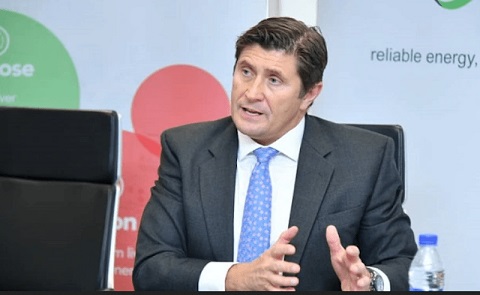Hot Stories
Recent Stories
Court Fixes Date To Rule On Seplat CEO’s Suspension
Posted by Thandiubani on Fri 24th Mar, 2023 - tori.ngJustice Chukwujekwu Aneke fixed the date on Thursday after entertaining arguments from counsel to the respondents.

A date has been fixed by the Federal High Court sitting in Lagos State to rule on various applications challenging the order restraining the Chief Executive Officer (CEO) of Seplat Energy Plc, Roger Brown, from parading himself as the CEO of the company.
On Thursday, Justice Chukwujekwu Aneke fixed March 30 to determine the case after entertaining arguments from counsel to the respondents on the applications seeking to vacate the ex-parte order earlier granted by the court and to strike out the suit.
On March 8, the court had restrained Roger from parading himself as the company’s CEO pending the determination of a suit instituted against him and others by some aggrieved stakeholders of the company.
The shareholders had, in their suit filed by their lawyer, Jeph C Njikonye, SAN, accused the foreigner of racism, favouring of expatriate workers, discrimination against Nigerians, and breach of good governance.
The aggrieved stakeholders who are petitioners/applicants in the suit are Moses Igbrude, Sarat Kudaisi, Kenneth Nnabike, Ajani Abidoye, and Robert Ibekwe while Seplat Energy Plc, Roger Thompson Brown, and Basil Omiyi were listed as respondents in the matter.
In a separate ex-parte application, Justice Aneke also granted the petitioners leave to serve the petition, the order of the court, and all other processes to be issued subsequently in the matter on Brown and Omiyi by pasting in the premises of Seplat Energy located in the Ikoyi area of the state.
At the proceedings today, counsel to the petitioners, Njikonye informed the judge that there are several applications before the court and that his application for an interlocutory injunction for joinder should be heard before applications seeking to discharge the ex parte order made by the court.
The lawyer also submitted that by the nature of the suit and by Order 29 Rule 1A of the Federal High Court (Civil Procedure) Rules, the application for joinder takes preeminence above other applications.
But counsel to the first respondent, Bode Olanipekun (SAN), opposed the application arguing that the ex-parte order granted by the court affected many other people who are not parties before the court.
Olanipekun maintained that those who are not parties have come to challenge the order and so the application for joinder was not ripe for hearing.
Counsel to the other respondents aligned themselves with Olanipekun’s submission, and they also asked the court to hear the application for setting aside the ex parte order made on March 8, 2023.
In a short ruling, Justice Aneke, held that the application for interlocutory injunction was not ripe for hearing; he, therefore, called on lawyers to the respondents to move their applications, before subsequently fixing his ruling for March 30.
Top Stories
Stories from this Category
Recent Stories















































